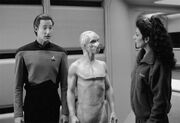Data successfully creates a new android, which he views as his child. However, the magnitude of his accomplishment quickly attracts the scrutiny of Starfleet, who wants to separate the child from Data and the Enterprise for study. Matters are complicated further when the child begins to develop beyond Data's abilities.
Summary[]
[]
- "Captain's log, Stardate 43657.0. While Commander Riker is away on personal leave, the Enterprise has traveled to Sector 396 to begin charting the Selebi asteroid belt."
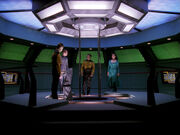
Data, Wesley, La Forge, and Troi in cybernetics
Wesley Crusher, Geordi La Forge, and Counselor Deanna Troi are walking in a corridor to Data's lab, where he has summoned them without revealing to them why. As they are walking, they speculate about what Data might have in store for them. La Forge says that ever since returning from a cybernetics conference, Data has been spending every free second in the lab as well as keeping it locked. When they finally arrive at the lab, they find out that he has created a Soong-type android and named it Lal. The android greets them and somewhat taken aback, they realize that it calls Data "father", upon which Data states that, in fact, Lal is his child.
Act One[]
- "Captain's log, supplemental. I have just been advised of a highly unusual project undertaken by Commander Data."
In his lab, Data explains that Lal has a positronic brain which is very similar to his own and that he began programming it at the cybernetics conference. La Forge points out that no one has ever been able to do such a thing, at least not after Data was created. Data explains that there was a new submicron matrix transfer technology introduced at the conference which he discovered could be used to lay down complex neural net pathways. Essentially, he did a transfer from his brain to Lal's.
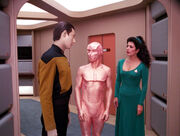
Lal before choosing a gender
Captain Jean-Luc Picard, who is also taken aback by this, tells Data that he would have liked to have been consulted. Data is a little surprised at the captain's request, pointing out that he has not ever noticed anyone else on board consulting him about their procreation. Troi asks why he hasn't given it a more Human look, as this model looks androgynous. Data states that he decided to allow his child to choose its own gender and appearance. Picard, whose state of mind borders ever closer to irritation, asks that Data see him in his ready room at his earliest convenience. When leaving, he asks Counselor Troi to accompany him. During their conversation down the corridor, Picard insists that they do whatever they can to discourage the perception of this new android as a child, for it is not a child, to Picard, but an invention, an extraordinary one. Deanna wonders why biology, rather than technology, should determine whether it's a child for, after all, Data has created an offspring, a new life out of his own being, which to her, suggests a child. She thinks that they have no say in Data's wish to call Lal his child. Picard states that he fails to understand how a five-foot android with heuristic learning systems and the strength of ten men can be called a child. Troi responds by pointing out that Picard has never been a parent.

Picard growing increasingly impatient with Data
Determined to put an end to this, Picard still has a conversation with Data in his ready room. He tells him that what he has done will have serious ramifications, especially after Starfleet finds out about it. Data apologizes, stating that he did not anticipate his objections and asks whether he should just turn it off. Picard angrily argues that he cannot just turn it on and off like a machine. He tells Data that he has taken on quite a responsibility by creating a new life, which, according to Picard, has nothing to do with the challenges of parenting itself. Data, however, wonders if that itself does not describe becoming a parent. Picard sighs, and lowers his head into his hands, realizing that he is just not getting through to him like this. But Data tries to make him understand by pointing out that in most species there is a primal instinct to perpetuate themselves and, until now, he has been the last of his kind. If he were to be damaged or destroyed, he would be lost forever. But if he is successful with the creation of Lal, his continuance is assured. He understands the risks and he is prepared to accept the responsibility.
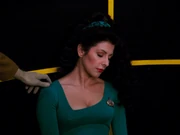
Troi asleep while waiting for Lal to choose an appearance
Later, Data and Troi take Lal to the holodeck so it can try on various appearances and genders. After many hours of searching several thousand composites that Data has selected, the choices are narrowed down to four: an Andorian female, a Human male, a Human female, and a Klingon male. After Troi's input on the pros and cons of each appearance, Data's offspring chooses to be a Human female.
Act Two[]
Data takes Lal into their quarters and tries to acquaint her with her new life, explaining to her that they are a family now. He teaches her about painting, which she identifies as colors produced on a surface by applying a pigment. He helps her process and understand the sense of touch and explains that there are many experiences that he wishes to share with her. Lal is very enthusiastic about all this and wants to learn more.
- "Second Officer's Science log, Supplemental. Training in social skills at the most elementary level has begun. Lal is progressing very slowly, but is not deterred by early setbacks. While motor coordination has improved 12%, reflexes still need to develop. Visual comprehension is especially difficult for Lal; translating her vast data banks into recognizable applications may improve with additional transfers. She is also learning to supplement her innate android behavior with simulated Human responses. And it is interesting to note that as I observe Lal learning about her world, I share in her experience, almost as though I am learning things over again."
Later in his lab, Wesley asks Data what Lal does while he is on duty. Data states that she studies in their quarters for she requires very little supervision. Wesley wonders if he has considered sending her to school, but Data responds that she already has full access to the sum of Human knowledge from him. Wesley objects that she could still learn a lot by being with children close to her own age. While they are discussing all this, Doctor Beverly Crusher calls in to remind Wesley of his haircut appointment. Wesley bemoans his mother's attentiveness as his parent and then tells Data that it is nothing personal.
After he leaves, Data turns Lal back on and she asks him quite curiously what her purpose is; her function, her reason for being. Data says that their function is to contribute in a positive way to the world in which they live. But Lal wonders why she is needed instead of someone else, she wonders where she came from. Data does not answer her questions directly, but rather moves on to point out that all her questioning is a very good sign, for now she will be able to process information on logic, aesthetics, metaphysics, and epistemology; she is truly becoming sentient by developing the awareness to question and examine her perceptions. Lal, however, carries on by asking a multitude of questions. A little overwhelmed by all her questions, Data turns her off mid-sentence.
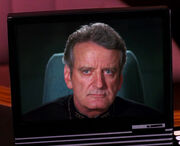
Admiral Haftel
In the meantime, Starfleet, which has gotten wind of the situation, communicates with Captain Picard about Lal. Picard tries to explain to Admiral Haftel that for Data, this android is his child and that he respects that. He is barely able to convince Starfleet to let Lal remain on board for the time being but is fully aware that the time will come where he has to make that dreaded tough decision about Lal's fate.
Lal's first day at school is not going so well either. The teacher, Ballard, explains to Data that she is too smart for most classes and the other children are afraid of her because she appears much older than them. Data takes her out of school and tries to explain certain things to her, such as peoples' fear of things that are different and which are new to them. Lal claims that she does not wish to be different.
A little helpless about how to guide and help Lal in this time, Data seeks out the help of Dr. Crusher, whom he considers to be an example of a good parent. In her office in sickbay, Data tells Crusher that Lal wishes to be more like the others and that he doesn't know how to help her. Crusher tells him that when Wes was growing up, he was a very bright boy, but also had a hard time making friends, mainly because the other children were intimidated by him. Crusher approached this by telling Wesley about herself, about when she was younger and unpopular. This made Wes see that she understood him. Data realizes that he has not told Lal how difficult it was for him to assimilate, because he was afraid it might discourage her. Crusher suggests that he lets her know that she is not alone and tells him to be there and nurture her when she needs love and attention. Data points out that he can give her attention but that he is totally incapable of giving her love. After he leaves, Crusher notes that she finds that hard to believe.
Later in his quarters, Captain Picard receives the dreaded message from Admiral Haftel, who explains to him that he has discussed the situation with Starfleet Command and the Enterprise is to hold position until he joins them to personally review the android's development. He advises him that if he is not satisfied with what he sees, he is empowered to take the android back with him.
Act Three[]
- "Captain's log, supplemental. We are holding position pending the arrival of Admiral Haftel, from Starfleet Research. Commander Data is completing his final neural transfers to the android he has named Lal, which I learned in the language Hindi means "beloved"."
Data decides to leave Lal in the care of the bartender Guinan, who begins to teach her the fundamentals of Human interaction and behavior. Guinan "hires" Lal, and tells her that the most important aspect of working in a place like Ten Forward is the art of listening. All three are surprised when Lal uses a verbal contraction (saying "I've" instead of "I have"), a skill which Data has never been able to master. She has exceeded his abilities, but Data does not know why or how.
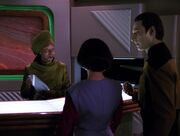
"Lal, how are you?"
"I am functioning within normal… I am fine, thank you."
Captain Picard calls Data to his ready room and explains Starfleet's desire to transfer Lal, and only Lal, to a more suitable environment. Data, who doesn't seem to understand the seriousness of the situation, states that he doesn't agree with that decision because he feels that Lal can learn a lot from his own experiences, as well as his mistakes, and that he should not be separated from her. Then it finally dawns on him that the admiral is questioning his ability as a parent when suggesting to take Lal to a different environment. He wonders if the admiral has children, which Picard confirms. Data speculates on how much experience Haftel had as a parent when his first child was born.
In Ten Forward, Lal, together with Guinan, is observing from the bar a couple engaged in typical courtship behavior. When the man kisses the girl, Lal exclaims that he is biting her. Guinan tells her that he is not biting her, but instead is kissing her. However, she leaves it up to Data to explain to Lal what follows after the couple leaves Ten Forward.
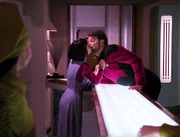
Lal kisses Commander Riker
Commander Riker, returning from leave and unaware of Data's creation, walks into Ten Forward and begins flirting with Lal, asking her casually if she is new around here. She experiments with some of her new knowledge by suddenly grabbing Riker from across the bar and kissing him; once she notices, Guinan quickly has her let go of Riker. At that moment, Data walks in, asking the commander what his intentions towards his daughter are. A shocked and confused Riker hastily excuses himself and rushes out of the bar.
Walking into their quarters, Lal realizes that she will never know love. Data tells her that it is a limitation they must accept, upon which Lal wonders why he is then still trying to emulate Humans. Data replies that it is the struggle itself that is most important; they must strive to be more than they are. It does not matter that they will never reach their ultimate goal, the effort itself yields its own rewards. Lal then, remembering what she learned about Humans holding hands and it being a symbolic gesture of affection, holds her father's hand in gratitude.
Act Four[]
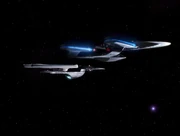
Admiral Haftel arrives
Admiral Haftel finally arrives, and the captain realizes that he did not come here to form an opinion, but to justify one. Picard asks for time, patience, and an open mind from the admiral – allowing Lal to stay with Data during her formative years until she is ready to move on to other tasks and challenges. The admiral states that this is not a satisfactory suggestion, because if mistakes are made, the damage might be irreparable. He also wonders why Picard is so insistent about this, asking him whether he seriously believes that they are breaking up a family of some sort. Picard angrily states that Data and Lal are living, sentient beings that have rights in their society; rights he helped define. But the admiral disagrees, stating that Lal might be the next pivotal step towards the development of artificial intelligence and that work like this demands to be done with controlled procedures in effective isolation.
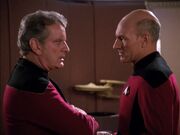
"…their rights have been defined; I helped define them!"
In an attempt to understand what Lal's life and development are like on the ship, the admiral decides to see her and talk to her. He is taken to Ten Forward, where Lal is working as a waitress. Even though Data tries to explain to him the value of letting Lal be in such an interactive environment where she can observe Human behavior, the admiral seriously questions Data's intentions of appropriate guidance. Picard tells the admiral that Lal is under the strict supervision of a woman he has complete trust in. Haftel is indignant to see a being that can run sixty trillion calculations a second working as a cocktail waitress. He is not even convinced that the behavior she observes here will have a good influence on her to begin with. Guinan joins in on the conversation by telling Haftel that people in Ten Forward generally behave themselves and when they don't, she asks them to leave. Haftel wants Lal out of there and wants her to report to him for an interview.
Lal goes to see the admiral in the observation lounge, who sugarcoats his intentions to her, telling her that Starfleet is very excited about meeting her soon. She wonders if she has done something wrong since they are planning to move her away from her father. The admiral tells her that they only want to take her with them so she can learn more, nothing else, for after all, there is only so much she can learn on a starship. Lal agrees, stating that after she has learned everything there is to learn aboard a starship, she will relocate. But the admiral insists that this is not the natural conclusion here. Trying to ameliorate the situation, Picard tries to point out the positive aspects of her going away and the admiral states how much respect he has for Data. Lal points out that he in fact does not speak of her father with respect. Picard then decides to ask Lal directly what she thinks about her father's ability to teach her and what her wishes are. Lal says that she wishes to remain on board the Enterprise.
After leaving the admiral, Lal, who is very upset, goes to see Counselor Troi. She is distraught and stutters about an admiral from Starfleet coming to take her away and that she is scared. Deanna is startled to realize she can sense Lal's fear. Lal is irritated and clearly frightened, unable to comprehend what she is feeling.
Act Five[]
In the observation lounge, Haftel orders Data to hand Lal over to Starfleet. He tries to appeal to Data's newfound sense of parenthood, explaining that there is a time where all parents have to let go of their children for their own good. Picard states that this is not the time, however, for the child depends on him. Data says that when he created Lal, it was in the hopes that one day she enters the Academy, that she become a member of Starfleet. He wanted to give something back in return for all that Starfleet has given him. But Lal is his child and he is being asked to volunteer to give her up; something he cannot do, for it would violate every lesson he has learned about Human parenting. It is his duty, and not Starfleet's, to guide this new life through all the steps to maturity, to prepare her to be a contributing member of society, to be there for her when she learns. No one can relieve him from that obligation. He is her father.
The admiral refuses to give in, and orders that Lal be transferred aboard his ship. Picard tells Data to belay that order, stating that he is willing to take this to the highest level of Starfleet himself if he has to. He politely responds that even though the admiral acknowledges their consciousness, he nevertheless still ignores their personal liberties and freedoms. "Order a man to hand his child over to the state? Not while I'm his captain," Picard states firmly. He is about to suggest that the admiral go with him to Starfleet about this, when Counselor Troi urgently calls Data to his lab.
Troi explains what has happened to Lal, how she was very frightened and then walked out of her quarters back to the lab. Lal was programmed to report back to the lab in case of a malfunction – a malfunction which Picard calls emotional awareness. Data states that this appears to be a cascade failure, requiring initialization of the base matrix without wiping out higher functions. The admiral agrees with him and asks Data whether he could assist in his efforts.
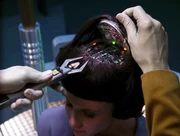
Lal's positronic brain
Hours later, La Forge, Troi, and Wesley are waiting outside Data's lab when Admiral Haftel emerges, exhausted and heartbroken. He says Lal cannot be saved and will not survive much longer. No matter what they did, something else would show up: they repolarized one pathway and another would collapse, and then another. Watching Data using every ounce of his inhuman speed, trying to stay ahead of Lal's breakdown, the admiral did not see an engineer trying to preserve his invention, only a father who refused to give up on his child, and sadly concludes, "it just… wasn't meant to be."
In the lab, Lal and Data share her last moments together: Data tells her that he is unable to correct the system failure, and that they must say goodbye now. Lal says that she feels… she tells him that she loves him and that even though he cannot feel it with her, she can feel it for both of them. Lal thanks her father for her life and the things she learned about: flirting, laughter, painting, family, female, Human…
Walking to the bridge, where everyone is gathered and concerned, Data explains that Lal suffered complete neural system failure at 1300 hours and that he deactivated the unit. Captain Picard tells him how much the entire crew is saddened by his loss. Data thanks him for the sympathy, but points out that she is there with him: that her presence enriched his life so much that he could not allow her to pass in oblivion. That is why he transferred her memories into himself.
Data takes his station on the bridge; however, as he looks out into space, it is clear that Lal's death has had an effect on him.
Log entries[]
Memorable quotes[]
"I fail to understand how a five-foot android with heuristic learning systems and the strength of ten men can be called a child."
"You've never been a parent."
- - Picard and Troi
"I have observed that in most species there is a primal instinct to perpetuate themselves. Until now I have been the last of my kind. If I would be damaged or destroyed, I will be lost forever. But if I am successful with the creation of Lal, my continuance is assured. I understand the risk, sir. And I am prepared to accept the responsibility."
- - Data
"Congratulations, Data! It's a girl!"
- - Troi to Data, after unveiling Lal's choice of gender
"I can give her attention, doctor. But I am incapable of giving her love."
(after Data leaves) "Now why do I find that so hard to believe?"
- - Data and Crusher
"He's biting that female!"
- - Lal, seeing a couple kiss
"Lal! Lal! Put him down!"
- - Guinan, after Lal grabs Riker and kisses him over Ten Forward's bar
"Why are they leaving?"
"Lal, there are some things your father's just gonna have to explain to you when he thinks you're ready."
- - Lal and Guinan, as the couple leave Ten Forward hand-in-hand
"Commander, what are your intentions towards my daughter?"
"Your daughter?!"
- - Data and Riker, just after Riker was kissed by Lal
"There are times, sir, when men of good conscience cannot blindly follow orders. You acknowledge their sentience but ignore their personal liberties and freedom. Order a man to turn his child over to the state? Not while I am his captain."
- - Picard, to Admiral Haftel, after Haftel orders Data to turn over Lal to Starfleet Command
"Hello, Data."
"Guinan."
"Lal, how are you?"
"I am functioning within normal… I'm fine, thank you."
"Good."
- - Guinan, speaking to Data and Lal as they walk in Ten Forward
"Then he is questioning my ability as a parent."
"In a manner of speaking…"
"Does the admiral have children, Sir?"
"I believe he does. Why?"
"I am forced to wonder how much experience he had as a parent when his first child was born."
- - Data and Picard
"We just want to broaden your experience. There is only so much you can learn on a starship."
- - Haftel
"I watch them, and I can do the things they do, but I will never feel the emotions. I'll never know love."
"It is a limitation we must learn to accept, Lal."
"Then why do you still try to emulate Humans? What purpose does it serve except to remind you that you are incomplete?"
"I have asked myself that, many times, as I have struggled to be more Human. Until I realized, it is the struggle itself that is most important. We must strive to be more than we are, Lal. It does not matter that we will never reach our ultimate goal. The effort yields its own rewards."
"You are wise, father."
"It is the difference between knowledge and experience."
- - Lal and Data
"She… she won't survive much longer. There was nothing anyone could have done. We'd repolarize one pathway and another would collapse. And then another. His… hands were moving faster than I could see, trying to stay ahead of each breakdown. He refused to give up. He was remarkable. Just… wasn't meant to be."
- - Haftel, close to tears, about him and Data trying to save Lal
"I feel."
"What do you feel, Lal?"
"I love you, father."
"I wish I could feel it with you."
"I will feel it for both of us… thank you for my life."
- - Lal and Data, saying goodbye
"Flirting… laughter… painting family… female… Human."
- - Lal (final words)
"I have transferred her memories… to me."
- - Data, explaining that Lal will continue to exist in his memories
Background information[]
Production history[]
- Coverage (titled "Bloodlines"): 27 October 1989 [1]
- Disapproving script notes in one-page memo from David Livingston (referring to story as "Bloodline"): 31 October 1989 [2]
- Revised final draft script: 19 December 1989 [3]
- Premiere airdate: 12 March 1990
- First UK airdate: 5 February 1992
Story and script[]
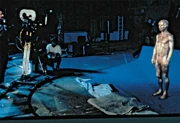
Crofoot filming the holodeck sequence on bluescreen
- This was the first Star Trek episode written by René Echevarria. "The Offspring", which initially had the working title "Bloodlines", originated in a spec script written by him. Michael Piller recalled, "'The Offspring' was a great spec script, except it was, at first, barely about our people. It was really about a very brand-new, exciting female android that Data created out of his own image, and it was all about her. And I said, 'That's great. But it can't be about the guest star. It's got to be about one of our people. It's got to be about Data. It's not about Data's child as much as it is about how Data deals with being a parent. Everybody will be able to relate to that and empathize with the problems he has as a parent of a new child. Especially when that child is threatened by all sorts of outside forces.'" (Star Trek: The Next Generation - The Continuing Mission 1st ed., p. 114)
- According to Echevarria, the story "changed considerably. Initially, Data was the father and the ship's computer was the mother. There was some comedy– Data argued with the computer about how to raise Lal. It had some jeopardy with a Ferengi. But what made Michael excited was that it took place entirely on the Enterprise. They needed a money-saver, and this was just the ticket." (Star Trek: The Next Generation 365, p. 142)

Rehearsing a scene
- The episode proceeded to develop as a group effort. According to Michael Piller, "It was a concept that I wanted to do, so we sat down with Gene and he came up with a number of suggestions and said this is what would make it fit into the Star Trek bible. Rick Berman added some crucial pieces to the puzzle. We [were] very determined to protect the uniqueness of Data as a character, but at the same time, it seemed to make perfect sense that one of the Human traits that Data would have observed and perhaps covet, is procreation and parenting. He would also know that his value to Starfleet was so great that if he were ever in an accident, he's too valuable to end with himself." Melinda M. Snodgrass noted, "I did a page one rewrite and Michael did another rewrite." (Captains' Logs: The Unauthorized Complete Trek Voyages, p. 193)
- In one of the scenes with Guinan tutoring Lal about Human sexuality, a script line was changed in order to turn a strictly heterosexual explanation into a gender-neutral version. Research assistant Richard Arnold recalled, "According to the script, Guinan was supposed to start telling Lal, 'When a man and a woman are in love…' and in the background, there would be men and women sitting at tables, holding hands. But Whoopi refused to say that. She said, 'This show is beyond that. It should be 'When two people are in love.'" It was also decided on set that the background of the scene show a same-sex couple holding hands, but "someone ran to a phone and made a call to the production office and that was nixed," continued Arnold. "[Producer] David Livingston came down and made sure that didn't happen." [4]
Production[]

Jonathan Frakes directs Hallie Todd
- This episode is considered a bottle show. (Captains' Logs: The Unauthorized Complete Trek Voyages, p. 193)
- This was the first Star Trek episode to be directed by Jonathan Frakes and the first to be directed by a member of the cast (although Leonard Nimoy and William Shatner had previously directed films). Frakes recalled, "I went to [Rick] Berman and said I'd like to do a show. He said I'd have to go to school, and so I spent about 300 hours in the editing room and on the dubbing stage learning about that side of it. Editing was the side of things I felt weakest in. I naturally looked over the shoulders of all our regular directors and took some seminars, read textbooks and finally I didn't go away. Rick was kind enough to give me 'The Offspring' and I was thrilled because I got a Data show and those always work." (Captains' Logs: The Unauthorized Complete Trek Voyages, p. 193)
- After this installment, many other Star Trek episodes were directed by a member of the cast, including other installments directed by Jonathan Frakes. Indeed, he went on to be one of Star Trek's most acclaimed directors, helming Star Trek: First Contact and Star Trek: Insurrection along with several episodes of Star Trek: The Next Generation, Star Trek: Deep Space Nine, Star Trek: Voyager, Star Trek: Discovery, Star Trek: Picard and Star Trek: Strange New Worlds.
- Jonathan Frakes also enjoyed collaborating with the shooting company that worked on this episode. "It was such a dysfunctional, wonderful family, both in front of and behind the camera, on the show," he reminisced. "By the time I directed on the third season, we'd all been together for three years. It was for ten months a year, so everyone knew each other and, generally, really loved each other. The cast was wonderful and hysterically funny and I was given a big bullhorn by the sound department. It was a very happy time. They all took the piss out of each other, and people were refusing to do what I asked. Everybody behaved exactly the way you'd want them to." (The Fifty-Year Mission: The Next 25 Years, p. 113)
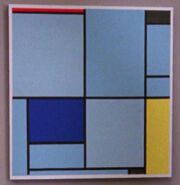
Data's painting
- The painting Data shows to Lal in his quarters is evidently "Tableau I" by Piet Mondrian.
Continuity[]
- Whereas the Season 2 episode "The Measure Of A Man" dealt with Data and his rights as an android, this episode deals with his rights as a parent toward what would constitute a living being. In both episodes, Picard acts as Data's advocate. Picard reinforces this when, in argument with Admiral Haftel, he states that an android's rights and sentience are well-defined in Federation law, and that Picard himself helped define them. In fact, as Melinda Snodgrass (who wrote "The Measure Of A Man") pointed out, there were striking similarities between the two installments. (Captains' Logs: The Unauthorized Complete Trek Voyages, p. 193)
- There was serious consideration for a follow-up episode in TNG's fifth season, that would have involved Lore stealing Lal's body and trying to re-activate her with Dr. Soong's emotion chip, but for unknown reasons it was shot down. [5]
- When Captain Picard and Deanna Troi are discussing the relevance of Lal's status as a child in the corridor, there is a reference to Troi's experience of being a parent from "The Child".
- In this episode, Data incorrectly states that until the activation of Lal, he was the last of his kind. He may be under the assumption that Lore had been incapacitated in "Datalore". In addition, he does not yet know about the Juliana Tainer and B-4 androids, introduced in the seventh season episode "Inheritance" and the film Star Trek Nemesis respectively.
- The painting Data shows to Lal in his quarters can be seen on an easel in his quarters in the fifth season episodes "Silicon Avatar", "A Matter Of Time", and "Hero Worship".
- This episode's working title, "Bloodlines", later became a title for an episode[!] in the seventh season. [6]
- The lift in the science laboratory was later reused in the chamber of the Borg Queen in VOY: "Dark Frontier".
- This episode is obliquely referenced when in 2399, Jean-Luc Picard remarked that Data had "always wanted a daughter". (PIC: "Remembrance")
Reception[]
- According to René Echevarria, "'The Offspring' will always have a special place in my heart since it was my first baby." [7](X)
- According to Jonathan Frakes, "The Offspring" was the best sci-fi episode ever written. (Interview from 2 November 2001, "Mission Overview Year Three – The Offspring", TNG Season 3 DVD special feature) He has also has cited this episode as his favorite episode of Star Trek that he directed. [8]
- This is one of Michael Dorn's two favorite TNG episodes, the other being "The Drumhead". [9]
- In contrast, Melinda Snodgrass commented, "I felt it was fairly obvious and tired and stupid and I didn't want to do it […] It had a lot to do with 'The Measure Of A Man', which I don't think we needed to do again so soon. It was a good show for Jonathan to start with. It was a nice bottle show and he didn't have to cope with alien cultures." (Captains' Logs: The Unauthorized Complete Trek Voyages, p. 193)
- Michael Piller named this episode (along with "The Inner Light" and "The Measure Of A Man") as one of his favorite TNG episodes, "because they had remarkable emotional impacts. And they genuinely explored the Human condition, which this franchise does better than any other when it does it well." (AOL chat, 1997) Piller elaborated, "The perfect show to follow "Yesterday's Enterprise" and a totally different kind of episode. The script and performances were great, and it was marvelously directed by Jonathan. My taste, it was as good a show as we had all year. When you have good character stuff, you've got my support." (Captains' Logs: The Unauthorized Complete Trek Voyages, p. 193)
- At Michael Piller's behest, this episode was given a repeat airing on the second of two weekends when people who would be voting in the technical categories of the 1990 Emmy Awards would be watching. Piller also very approvingly referred to the installment in a memo he sent Rick Berman to arrange this (on 18 April 1990), commenting, "I think 'The Offspring' is a more 'serious' (and frankly better) episode than 'Yesterday's Enterprise'." Berman disagreed, favoring the latter installment in a memo of his own (dated 8 May 1990), prior to this episode's repeat. Berman implied, in the same memo, that "The Offspring" wasn't as popular with the TNG department heads either, and Eric A. Stillwell later remarked that he had been right. (The Making of Yesterday's Enterprise, pp. 91-93)
- Actress Mary Wiseman cited this as her favorite episode, remarking, "It's just a gorgeous story about what it means to have a child, and to be a parent." (Star Trek Magazine Discovery Collector's Edition, p. 28)
- A mission report for this episode, by Robert Greenberger, was published in The Official Star Trek: The Next Generation Magazine issue 13, pp. 43-46.
Apocrypha[]
In the short story "The Embrace of Cold Architects" by David R. George III, collected in the Star Trek: Myriad Universes anthology Shattered Light, Lal's creation was delayed after Data missed the cybernetics conference referenced, and only completed his work shortly before the Borg invasion in "The Best of Both Worlds" and "The Best of Both Worlds, Part II". As a result, her existence allowed Picard to "distract" the Borg by focusing on Lal and the long-term implications of her existence after he became Locutus of Borg, allowing Riker time to give the order to destroy his Borg cube and kill Locutus before the Borg could find and adapt to their attack. Lal's subsequent breakdown was then averted by the intervention of Doctor Noonien Soong when he "summoned" Data to him, much as he does in "Brothers", Soong's expertise allowing him to repair the damage to Lal's neural net. With the information of how to create stable androids, the Federation began creation of a new race of android soldiers intended to fight the Borg, but Data was able to destroy their prototypes to prevent his "children" becoming slaves.
Video and DVD releases[]
- Original UK VHS release (two-episode tapes, CIC Video): Volume 32, catalog number VHR 2552, 6 December 1991
- As part of the UK VHS collection Star Trek: The Next Generation - Data Box: 6 November 1995
- As part of the US VHS collection Star Trek: The Next Generation - The Data Collection: 19 August 1997
- As part of the UK VHS collection Star Trek: The Next Generation - 10th Anniversary Collector's Edition, under the "Data" section, 29 September 1997
- UK re-release (three-episode tapes, Paramount Home Entertainment): Volume 3.6, 14 August 2000
- As part of the TNG Season 3 DVD collection
- As part of the TNG Season 3 Blu-ray collection
Links and references[]
Starring[]
Also starring[]
- LeVar Burton as Lt. Cmdr. Geordi La Forge
- Michael Dorn as Lieutenant Worf
- Gates McFadden as Dr. Beverly Crusher
- Marina Sirtis as Counselor Deanna Troi
- Brent Spiner as Lt. Commander Data
- Wil Wheaton as Wesley Crusher
Guest stars[]
- Hallie Todd as Lal
- Nicolas Coster as Haftel
- And
Special guest star[]
Co-stars[]
- Judyann Elder as Lt. Ballard
- Diane Moser as Ten Forward Crew
- Hayne Bayle as Ten Forward Crew
- Maria Leone as Ten Forward Crew
- James G. Becker as Ten Forward Crew
Uncredited co-stars[]
- Rachen Assapiomonwait as Nelson
- Michael Braveheart as Martinez
- Carrie Crain as Ten Forward waitress
- Leonard Crofoot as Lal-Mannequin
- Kristina Kochoff as Lal as Andorian
- Mark Lentry as science division officer
- Debbie Marsh as civilian
- Tim McCormack as Bennett
- Michael Moorehead as science division ensign
- Keith Rayve as command division ensign
- John Rice as science division officer
- Guy Vardaman as Darien Wallace
- Andy Wiley as Lal as Human male
- Unknown performers as
Stand-ins[]
- James G. Becker – stand-in for Jonathan Frakes
- Jeffrey Deacon – stand-in for Patrick Stewart
- Nora Leonhardt – stand-in for Marina Sirtis
- Tim McCormack – stand-in for Brent Spiner
- Lorine Mendell – stand-in for Gates McFadden
- Guy Vardaman – stand-in for Wil Wheaton
References[]
17th century; ability; admiration; advice; aesthetics; affection; age; anatomy; Andorian; android; annex; answer; argument; arrival; artificial intelligence; "at all"; "at least"; "at once"; "at your convenience"; attention; attitude; awareness; bar; base matrix; behavior; behavioral norms; beverage; biology; biting; black; blinking; calculations per second; career; chair; child (children); childhood; choice; clothing; cocktail waitress; color; "come in"; "come on"; composite; computer; conclusion; confusion; course; creator; crewmate; crosslink transfer series; cultural norms; custom; cybernetics conference; damage; data bank; daughter; day; day care center; Daystrom Institute; diagnostic procedure; discussion; doctrine; emotion; emotional awareness; environment; epistemology; error; Ethics, The; evaluation; evaluative procedure; evidence; Excelsior-class; experience; expertise; eye color; facility; fact; family; father; fear; feeling; female; finalist; firstborn; flirting; flower; foot; freedom; friend; Galor IV; gesture; guide; Haftel's children; Haftel's transport; haircut; hand; hand holding; "hello"; heuristic associative pathway; heuristic learning system; higher functions; Hindi; holodeck; home; Human; humor; "I do not know"; "I see"; idea; "in a manner of speaking"; "in existence"; "in fact"; "in favor of"; "in the event of"; "in your time"; information; inspection; intention; interview; invention; isolation; job; judgment; kissing; Klingon; knowledge; language; laughter; learning; lesson; liberal; liberty; life; lip; listening; logic; loneliness; love; male; malfunction; maturity; memory; metaphysics; Midsummer Night's Dream, A; minute; mission; mistake; mister; model; motor coordination; name; neural net pathway; neural system failure; neuter; "nice to meet you"; "not at all"; objection; obligation; "of course"; "of course not"; offspring; "on board"; "on duty"; "on my way"; "open mind"; opinion; opportunity; order; Otar II; painting; parameters; parent; parenting; patience; percent; perception; personal leave; personnel; pigment; place; planetary geophysics; plate tectonics; policy; positronic brain; positronic matrix activity; priority one; privilege; problem; procreation; progress; program; project; quantum level; quarters; question; record; reflex; research; residence; respect; result; right; Riker's shuttle; risk; Romulan; school; score; Sector 396; Sector 396 star; Selebi asteroid belt; sense; sentience; sentiment; sex (aka gender); sexuality; signal; "sit down"; skill; skin; sky; smell; social activity; social skills; social unit; socialization; society; sofa; Soong, Noonien; Soong-type android; "spare the rod and spoil the child"; species; Spinoza; starbase; Starfleet; Starfleet Academy; Starfleet Command; Starfleet regulations; Starfleet Research; starship; state; status report; strength; submicron matrix transfer; supervision; symbol; sympathy; symptom; technology; telepathy; test; thing; thought; thousand; time; "to the best of my ability"; touch; training; trillion; trust; turbolift; umbilical cord; verbal contraction; verbal pattern; verbalization; visit; visual comprehension; volunteer; walking; week; wish; word; work
Unreferenced material[]
Other references[]
- Evolution of Intelligent Life on Planet Denkir IV: Delphoidia; Delphoidia cochrani; Delphoidia cochrani obliquidens; Delphoidia cochrani tempus; Delphoidia moroboshi; Delphoidia moroboshi lum; Neopictis; Neopictis gourami; Neopictis spinotap; Neopictis spinotap cochrani; Oceosauroida; Oceosauroida mendo; Oceosauroida mendo shinobu; Oceosauroida mendo shutaro; Oniboshi lum; Oniboshi lum ran; Oniobshi benten; Squaluformus; Squaluformus vino; Squaluformus vino shiro; Vermacelli alfredo
External links[]
- "The Offspring" at Memory Beta, the wiki for licensed Star Trek works
- "The Offspring" at Wikipedia
- "The Offspring" at MissionLogPodcast.com
- "The Offspring" script at Star Trek Minutiae
- "The Offspring" at the Internet Movie Database
Previous episode:
|
Next episode:
|


